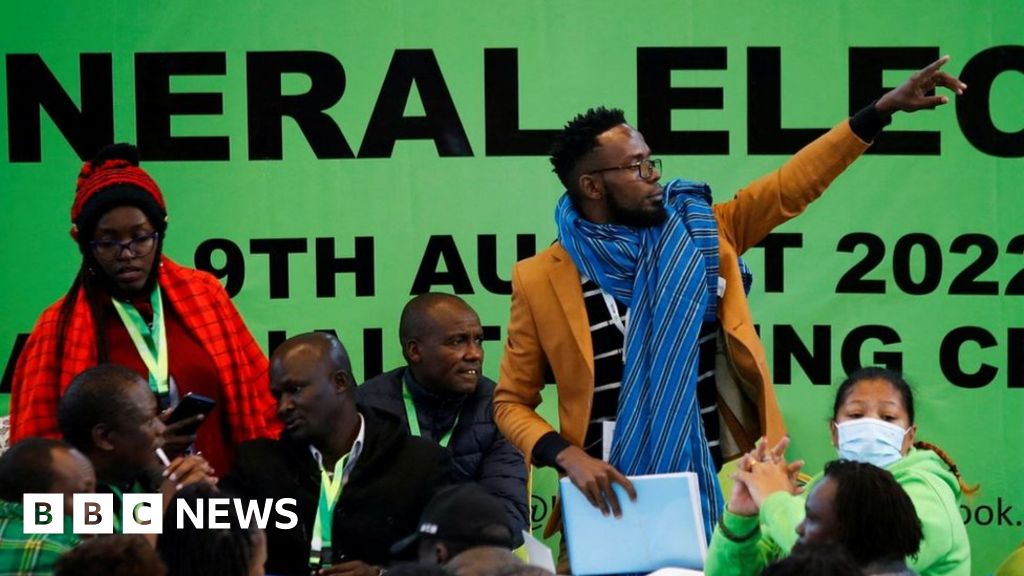
Kenya elections 2022: Raila Odinga and William Ruto in tight dignified race
By Dickens Olewe
BBC News, Nairobi
Kenya's electoral body has microscopic access to the national tallying centre in order to posthaste up the process of verifying presidential results.
Anyone who is not a party agent, election observer or part of the media should crop the venue.
The verification of results has been paused several times after complaints by supporters of the main candidates.
Confirmed results show conventional Prime Minister Raila Odinga has a slight edge over Deputy President William Ruto.
With 93 of the 292 constituencies declared, he has 52% of the vote against 47% for Mr Ruto.
However, provisional results tallied by media organisations using official data from the 46,000 polling stations show a tight race between the two candidates. About 14 million votes were cast - a turnout of 65%.
The electoral commission has up to Tuesday next week to whine the winner.
"We have to make adjustments" to quicken the treat of verifying results, the head of the electoral body Wafula Chebukati said in his spanking briefing on Saturday.
"It's taking three to four hours" to treat one each results from a single constituency, he said. "Some of our returning officers have stayed here for three days sitting on chairs which is totally unacceptable."
He announced that binary staff would help clear the remaining 124 poll officials, as well as give party agents copies of the survive results forms which they can compare with those sent electronically.
Extra police officers have also been drafted in.
"We absorb that this will fasten the process and we should be able to dispose of the returning officers in the flows of today," Mr Chebubati said.
Media tallies of results from more than 46,000 polling stations - posted on the electoral commission's website - have commanded some confusion in the country because the counts didn't match.
Officials denied claims on social reflect that fake results had been posted after the controls hosting the results was hacked.
"Nothing like that has happened. It is misinformation," said the electoral commission's CEO Marjan Hussein Marjan.
What is happening at the main tallying centre?
Based at a cultural centre named Bomas in the capital, Nairobi, officials from the Independent Electoral and Boundaries Commission (IEBC) are busy verifying results.
Security has been enhanced at the venue and access to the compound microscopic.
Electoral officials are comparing photographs of stop forms from more than 46,000 polling stations nationwide to brute forms being brought to centre by officials from each of the 290 constituencies.
This is to rebuked that the results match.
Mr Chebukati had accused agents from the main parties, who are witnessing the process, of turning a straightforward consume into a "forensic" one.
There is a thought of anxiety in the country as disputed elections in the past have led to violence or the whole treat being cancelled.
Kenya's presidential vote: What scenarios to expect
Following the 2007 vote, at least 1,200 country were killed and 600,000 fled their homes following claims of a stolen election.
In 2017, huge logistical errors led the Supreme Court to annul the finish and order the presidential poll to be re-run.
Officials are thought pressure to get things right this time.
The republic often grinds to a halt during elections, activities across the republic have slowed and schools remain closed at least pending next week on Monday. In Nairobi's central business district, the usually busy streets are mostly deserted.
Allegations of campaign rigging are as old as the country. It was part of politics even beforehand multiparty elections were re-introduced in the 1990s, but the push for free and fair elections has never faltered.
After the violence that followed the 2007 campaign, political parties and activists argued for the use of technology instead of bodily registers, which could be easily manipulated, to verify voters.
This year's campaign is the third time technology has been used but it has yet to declare an election that has not been challenged in the courts.
When will we know the result?
It's unclear when the last results will be known, but the electoral commission has small up the verification of the results.
If there is a certain leader of the race, celebrations are likely to break out - but only the IEBC can make it official.
To win the high-level race in the first round, a candidate needs:
- more than half of all the votes cast across the country
- at least 25% of the votes cast in a minimum of 24 counties.
Otherwise voting goes to a additional round which by law has to happen by 8 September.
Sincery TRENDING NEWS TODAY
SRC: https://www.bbc.co.uk/news/world-africa-62534541?at_medium=RSS&at_campaign=KARANGA
Powered by Me
